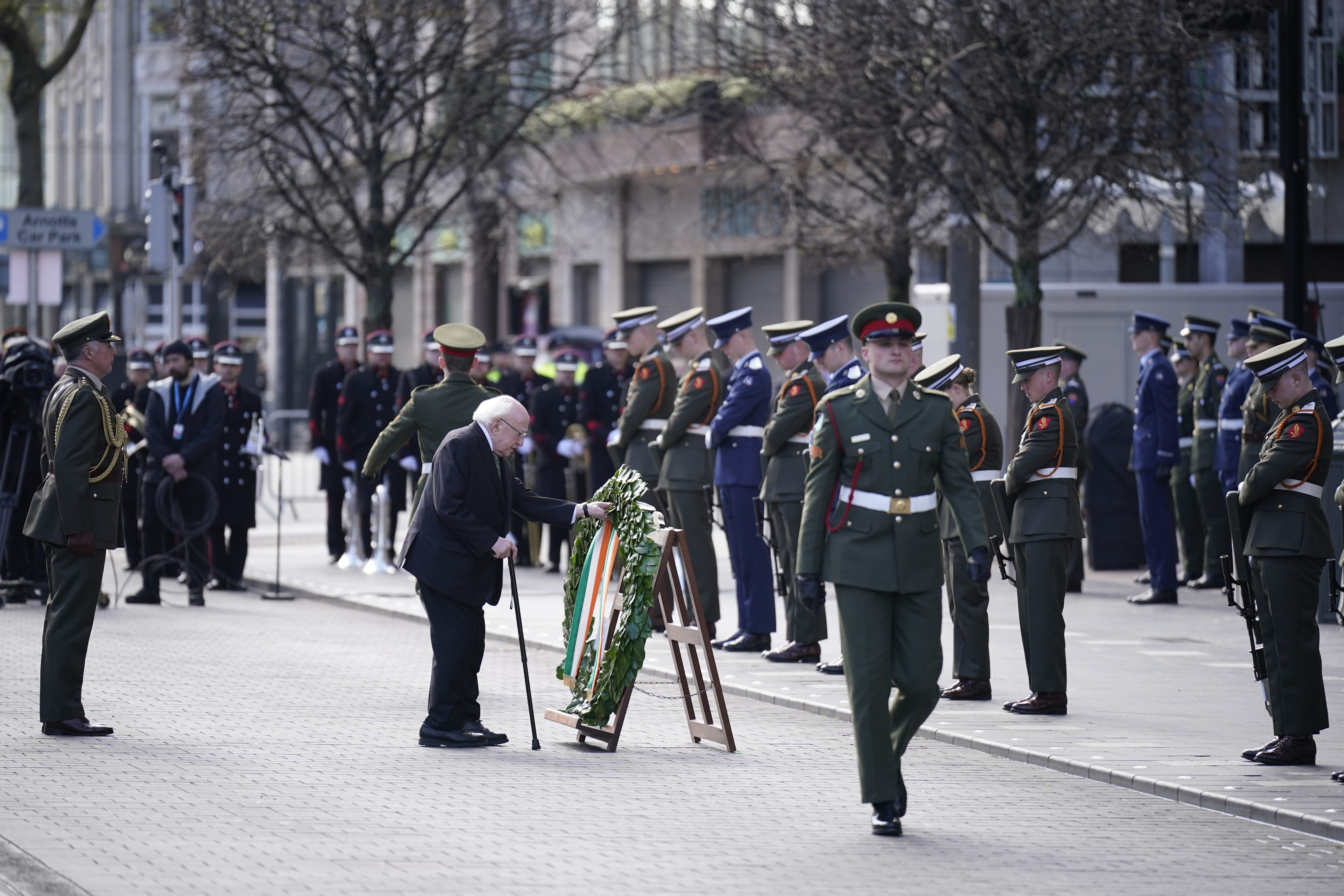Political leaders gather at GPO for ‘moving’ Easter Rising ceremony
The Irish captain who read out the 1916 proclamation of independence said the ‘whole aim of the proclamation is inclusion’.

Your support helps us to tell the story
From reproductive rights to climate change to Big Tech, The Independent is on the ground when the story is developing. Whether it's investigating the financials of Elon Musk's pro-Trump PAC or producing our latest documentary, 'The A Word', which shines a light on the American women fighting for reproductive rights, we know how important it is to parse out the facts from the messaging.
At such a critical moment in US history, we need reporters on the ground. Your donation allows us to keep sending journalists to speak to both sides of the story.
The Independent is trusted by Americans across the entire political spectrum. And unlike many other quality news outlets, we choose not to lock Americans out of our reporting and analysis with paywalls. We believe quality journalism should be available to everyone, paid for by those who can afford it.
Your support makes all the difference.Hundreds have gathered in Dublin city to watch a ceremony marking 108 years since the 1916 Rising against British rule in Ireland.
Irish president Michael D Higgins and Irish premier Leo Varadkar led the annual State commemoration, as Sinn Fein leader Mary Lou McDonald said that the proclamation still resonates over a century later.
Army personnel and the brass and pipe bands lined up outside the capital’s iconic GPO building on O’Connell Street for the ceremony, which involved an army flyover and the president laying a wreath for those who had died.
The 1916 proclamation was read out in full by Captain Paul Murphy, who learned it off by heart.
“(There were) a lot of trips to work reciting it in the car, a lot of moments brushing my teeth in the mirror learning it,” he told the media afterwards.
“It’s a very important day in Irish history and I wanted to give it the deference and the weight it deserved,” he said.
He added: “108 years on from it I’m sure the men that day would be more than privileged to know that it’s still a seminal day in Irish history.
“The proclamation itself, it’s still very relevant, the whole aim of the proclamation is inclusion. The very first line is ‘Irish men and Irish women’.
“For back then, in that time in the world, to point straight to that, and it talks about equal rights for everybody, equal opportunities.
“So the values it stands for are still true today and are still things we’re trying to get to today all around the world.
“For those men to write that and for it still to be as relevant today as it was then is a fair statement.”
President Higgins laid a wreath to commemorate those who died in the 1916 Rising and stood as a minute’s silence was held.
At the end of the ceremony, the flag was raised to full mast, the national anthem was played, and the Air Corps flew overhead.
Among those in attendance were Fine Gael leader and Further Education minister Simon Harris, First Minister of Northern Ireland Michelle O’Neill and Sinn Fein leader Mary Lou McDonald.
Mr Harris was seen speaking to former Irish president Mary McAleese and Ms O’Neill.
Ms McDonald and Ms O’Neill greeted members of the public and posed for photos after the ceremony ended.
“I think Easter is a time of remembrance but it’s also a time of huge hope for people,” she said, adding that she felt “an appetite for change” on days like Sunday.
“On a day like this we remember the brilliant, brave, courageous things that Irish people can do when they have their mind to it and I think that’s the sense of optimism that I’m picking up today.
“I think the whole proclamation resonates and matters today as much as 108 years ago, and it speaks to men and women, it speaks to diversity, it speaks to fairness, it speaks to using the resources of Ireland for the collective good. It still is a very radical document even now and the thing is it hasn’t been fulfilled.”
Mr Harris, who said when he put this year’s 1916 Easter Rising commemoration in his diary he didn’t expect to be attending it as Fine Gael leader, said it was a “really important” day.
“I remember when the whole decade of centenaries started, there was a lot of debate in Ireland as to how Ireland would handle commemoration – would we do them well? And I must say, I’m really proud,” he told reporters.
“I was just in the GPO behind us there and meeting young boys and girls wearing their great great grandfathers’ medals on their own jumpers and that sense of pride and history and connection.
“So I think today is really important, I think it’s done very well, and I think it’s a real opportunity for the next generation to continue to be kept informed of our history.”
Irish deputy premier Micheal Martin, who is Defence minister, Transport minister Eamon Ryan, Enterprise minister Simon Coveney and Housing minister Darragh O’Brien were also in attendance.
Mr Ryan said the ceremony was “very moving” and “beautiful”.